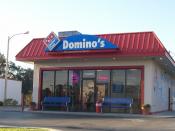Czech has been moving over the last decade and a half from a centralist socialist economy toward a democratic capitalistic economy. The Czech country is not part of a legal country of states like the United States that forms the U.S. capitalistic market; the Czech economy is trying to expand its country's economic market by transitioning its old socialist planned economy into the European Union. The point is that Czech economy will have a larger market similar to the United States, but Czech will remain its own country. Similarly, to the United States, the membership of the European Union has monetary advantages in terms of having a bigger market like in the United States. Some of this transition to joining the European Union has occurred for Czech, but Czech does not yet economically qualify for the conversion of its money, the Koruna, into the Euro Dollar (Natalucci and Ravenna, 2002).
The example of the Czech man, Steve, who is interested in opening a pizzeria in Czech, based on his pizzeria experience in the city of Chicago in the U.S. is destined for success in opening his own version of a pizzeria in Prague, Czech. Since Steve has been to Czech, he knows that Czech people enjoy pizza like in the U.S., but Steve saw that in Prague the pizza was served in a restaurant atmosphere, and not at fast food places like Dominos Pizza and Pizza Hut (Prague City, 2006). Steve accepts that Czech is a different culture, but the risk of starting a pizza business is low since Czech has a famous history of baked goods like in the United States. Since Steve has chosen Chicago style pizza pie because it can be served like a baked pie or some version similar to baked goods such as foccaccia with...


